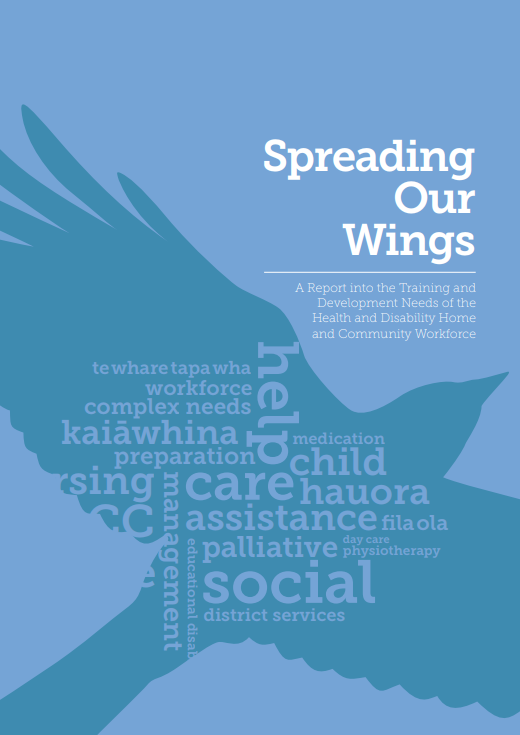While much is known about the state of the workforce for the higher profile health sectors such as care in hospitals and challenges for aged residential care and mental health and addiction, very little is known about the current state of the home and community support workforce. This is despite it being a 16,000-strong workforce, responsible for providing home support services for approximately 75,000 people aged over 65, numerous New Zealanders recovering from injury, and 7900 disabled people in 2017.
According to Gill Genet, General Manager for Business Development at Careerforce, “this workforce will play a huge role in fulfilling the NZ Health Strategy, a key tenet of which is to provide care and support as close to the home as possible. We commissioned the Home and Community Health Association (HCHA) to compile a workforce report to understand the emerging health and wellbeing needs of people living at home and how that translates into developing the support workforce”.
This report, Spreading our Wings – A Report into the Training and Development Needs of the Health & Disability Home and Community Workforce, has just been published, and has highlighted many areas for both concern and opportunity, including:
- The current growth in demand for home & community support services will continue to grow, largely driven by population changes including an ageing population, and the related increasing presence of co-morbidities. Set against this demand growth is a significant workforce supply issue with 55% of support workers aged 55 or over.
- Exacerbating the development of workforce supply is acknowledgement within the report of the resources needed to develop a fit for purpose, including culturally responsive, workforce that reflects the changing population demographics. In addition, one employer estimated that a third of their level 2 [qualification] support workforce struggle with literacy.
- The report, the first for this sector, came up with an initial 22 recommendations to support future workforce development, noting that working collaboratively, much can be done.
Download the Spreading our Wings Report
Andrea McLeod, HCHA Chairperson, was not surprised by the main findings in the report, but feels strongly that the lack of workforce modelling for this workforce poses a red flag, that requires action. “The report confirmed concerns we have about our workforce, in terms of aging and supply. The home support workforce is generally older than other health workforces, and there is not an obvious pool of replacements. This is a big challenge. Training is also an issue – both in terms of funding and in having qualifications that are a good fit and are flexible for clients and services.”
Like many health services, home and community support services are financially stretched. According to the HCHA, this represents a significant problem as the services being provided need to grow to be responsive to increasing needs, more client choice, more integrated health care, and the impacts of technology.
McLeod expects that this report will be very useful for providers as they review their workforce development plans, think about their responses to clients, and prepare for service reviews. “We all need to work very collaboratively, and strongly recommend that funders use the document as a reference, checking its content and data against their service planning and client analysis. We expect that Health Workforce NZ, ACC, the Ministry of Health and MBIE will find the document very useful as part of their broader health workforce modelling and resourcing work. We also expect that the report will inform qualification development and training support provided by Careerforce.”
For Genet from Careerforce, “we are in the midst of a Qualifications Pathway Review, and we need to understand the needs of the employer’s clients today and tomorrow, if we are to build a workforce that supports population health and community wellbeing. Client need information impacts on workforce development, including guidance on the new roles this sector needs. This report provides these insights. We are establishing a joint work programme with the HCHA, to ensure we action the key findings from this report.”
This report serves to reinforce that the New Zealand health and wellbeing sectors face enormous challenges going forward, and the development of the associated workforces will have a considerable bearing on how this challenge is met. As the government appointed qualifications developer for the health and wellbeing sector, Careerforce is committed to robust and transparent reviews of the sector qualifications to ensure that they continue to meet the evolving needs of sector funders and employers, and most importantly, the clients.
The full report, which includes a main report and three supporting background papers can be found here. A hard copy is available upon request.
This is a joint media release from Careerforce and the Home & Community Health Association (HCHA).
For all media enquiries please contact Paul Williams, Careerforce Marketing & Communications Manager on 027 600 7395, or at paul.williams@careerforce.org.nz. , or Andrea McLeod, HCHA Chairperson on 021 809 068, or at info@hcha.org.nz
Careerforce is the Industry Training Organisation (ITO) for the health, mental health, youth work, disability, social services and cleaning sectors. Careerforce support employers across New Zealand’s health and wellbeing sectors to run workplace training programmes, allowing staff to achieve nationally recognised qualifications on and off the job. It is the Government appointed body that sets skill standards, develops and facilitates achievement of NZQA qualifications across all our sectors. For more information please see www.careerforce.org.nz
HCHA is the peak industry body representing providers of home and community support services in the health & disability sector. For more information, please see www.hcha.org.nz


